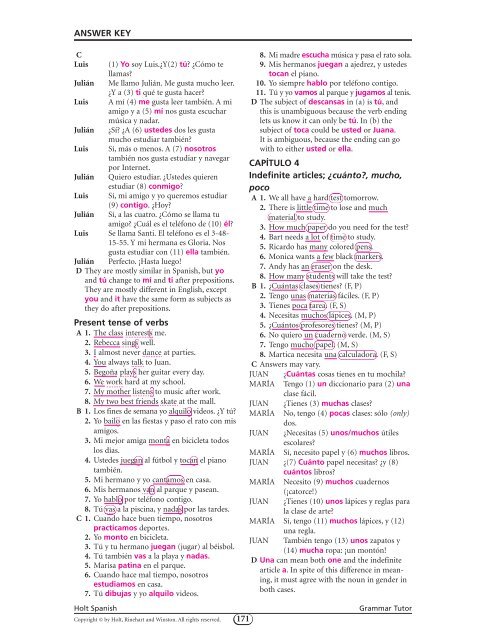grammar_tutor1-4 - Gertz-Ressler High School
grammar_tutor1-4 - Gertz-Ressler High School
grammar_tutor1-4 - Gertz-Ressler High School
Create successful ePaper yourself
Turn your PDF publications into a flip-book with our unique Google optimized e-Paper software.
ANSWER KEY<br />
C<br />
Luis (1) Yo soy Luis.¿Y(2) tú? ¿Cómo te<br />
llamas?<br />
Julián Me llamo Julián. Me gusta mucho leer.<br />
¿Y a (3) ti qué te gusta hacer?<br />
Luis A mí (4) me gusta leer también. A mi<br />
amigo y a (5) mí nos gusta escuchar<br />
música y nadar.<br />
Julián ¿Sí? ¿A (6) ustedes dos les gusta<br />
mucho estudiar también?<br />
Luis Sí, más o menos. A (7) nosotros<br />
también nos gusta estudiar y navegar<br />
por Internet.<br />
Julián Quiero estudiar. ¿Ustedes quieren<br />
estudiar (8) conmigo?<br />
Luis Sí, mi amigo y yo queremos estudiar<br />
(9) contigo.¿Hoy?<br />
Julián Sí, a las cuatro. ¿Cómo se llama tu<br />
amigo? ¿Cuál es el teléfono de (10) él?<br />
Luis Se llama Santi. El teléfono es el 3-48-<br />
15-55. Y mi hermana es Gloria. Nos<br />
gusta estudiar con (11) ella también.<br />
Julián Perfecto. ¡Hasta luego!<br />
D They are mostly similar in Spanish, but yo<br />
and tú change to mí and ti after prepositions.<br />
They are mostly different in English, except<br />
you and it have the same form as subjects as<br />
they do after prepositions.<br />
Present tense of verbs<br />
A1.The class interests me.<br />
2. Rebecca sings well.<br />
3. I almost never dance at parties.<br />
4. You always talk to Juan.<br />
5. Begoña plays her guitar every day.<br />
6. We work hard at my school.<br />
7. My mother listens to music after work.<br />
8. My two best friends skate at the mall.<br />
B1.Los fines de semana yo alquilo videos. ¿Y tú?<br />
2. Yo bailo en las fiestas y paso el rato con mis<br />
amigos.<br />
3. Mi mejor amiga monta en bicicleta todos<br />
los días.<br />
4. Ustedes juegan al fútbol y tocan el piano<br />
también.<br />
5. Mi hermano y yo cantamos en casa.<br />
6. Mis hermanos van al parque y pasean.<br />
7. Yo hablo por teléfono contigo.<br />
8. Tú vas a la piscina, y nadas por las tardes.<br />
C1.Cuando hace buen tiempo, nosotros<br />
practicamos deportes.<br />
2. Yo monto en bicicleta.<br />
3. Tú y tu hermano juegan (jugar) al béisbol.<br />
4. Tú también vas a la playa y nadas.<br />
5. Marisa patina en el parque.<br />
6. Cuando hace mal tiempo, nosotros<br />
estudiamos en casa.<br />
7. Tú dibujas y yo alquilo videos.<br />
8. Mi madre escucha música y pasa el rato sola.<br />
9. Mis hermanos juegan a ajedrez, y ustedes<br />
tocan el piano.<br />
10. Yo siempre hablo por teléfono contigo.<br />
11. Tú y yo vamos al parque y jugamos al tenis.<br />
D The subject of descansas in (a) is tú, and<br />
this is unambiguous because the verb ending<br />
lets us know it can only be tú.In (b) the<br />
subject of toca could be usted or Juana.<br />
It is ambiguous, because the ending can go<br />
with to either usted or ella.<br />
CAPÍTULO 4<br />
Indefinite articles; ¿cuánto?, mucho,<br />
poco<br />
A1.We all have a hard test tomorrow.<br />
2. There is little time to lose and much<br />
material to study.<br />
3. How much paper do you need for the test?<br />
4. Bart needs a lot of time to study.<br />
5. Ricardo has many colored pens.<br />
6. Monica wants a few black markers.<br />
7. Andy has an eraser on the desk.<br />
8. How many students will take the test?<br />
B1.¿Cuántas clases tienes? (F, P)<br />
2. Tengo unas materias fáciles. (F, P)<br />
3. Tienes poca tarea. (F, S)<br />
4. Necesitas muchos lápices. (M, P)<br />
5. ¿Cuántos profesores tienes? (M, P)<br />
6. No quiero un cuaderno verde. (M, S)<br />
7. Tengo mucho papel. (M, S)<br />
8. Martica necesita una calculadora. (F, S)<br />
C Answers may vary.<br />
JUAN ¿Cuántas cosas tienes en tu mochila?<br />
MARÍA Tengo (1) un diccionario para (2) una<br />
clase fácil.<br />
JUAN ¿Tienes (3) muchas clases?<br />
MARÍA No, tengo (4) pocas clases: sólo (only)<br />
dos.<br />
JUAN ¿Necesitas (5) unos/muchos útiles<br />
escolares?<br />
MARÍA Sí, necesito papel y (6) muchos libros.<br />
JUAN ¿(7) Cuánto papel necesitas? ¿y (8)<br />
cuántos libros?<br />
MARÍA Necesito (9) muchos cuadernos<br />
(¡catorce!)<br />
JUAN ¿Tienes (10) unos lápices y reglas para<br />
la clase de arte?<br />
MARÍA Sí, tengo (11) muchos lápices, y (12)<br />
una regla.<br />
JUAN También tengo (13) unos zapatos y<br />
(14) mucha ropa: ¡un montón!<br />
D Una can mean both one and the indefinite<br />
article a.In spite of this difference in meaning,<br />
it must agree with the noun in gender in<br />
both cases.<br />
Holt Spanish Grammar Tutor<br />
Copyright © by Holt, Rinehart and Winston. All rights reserved. 171


